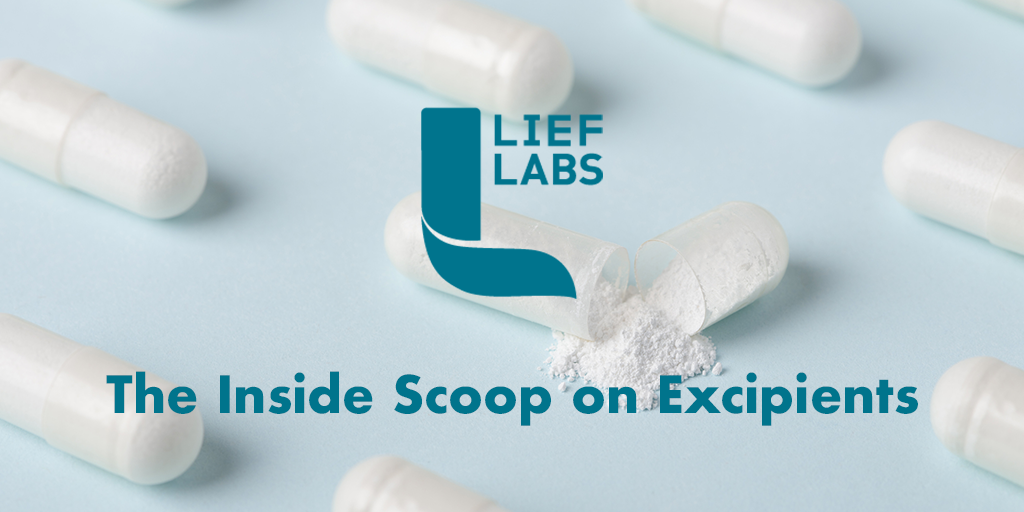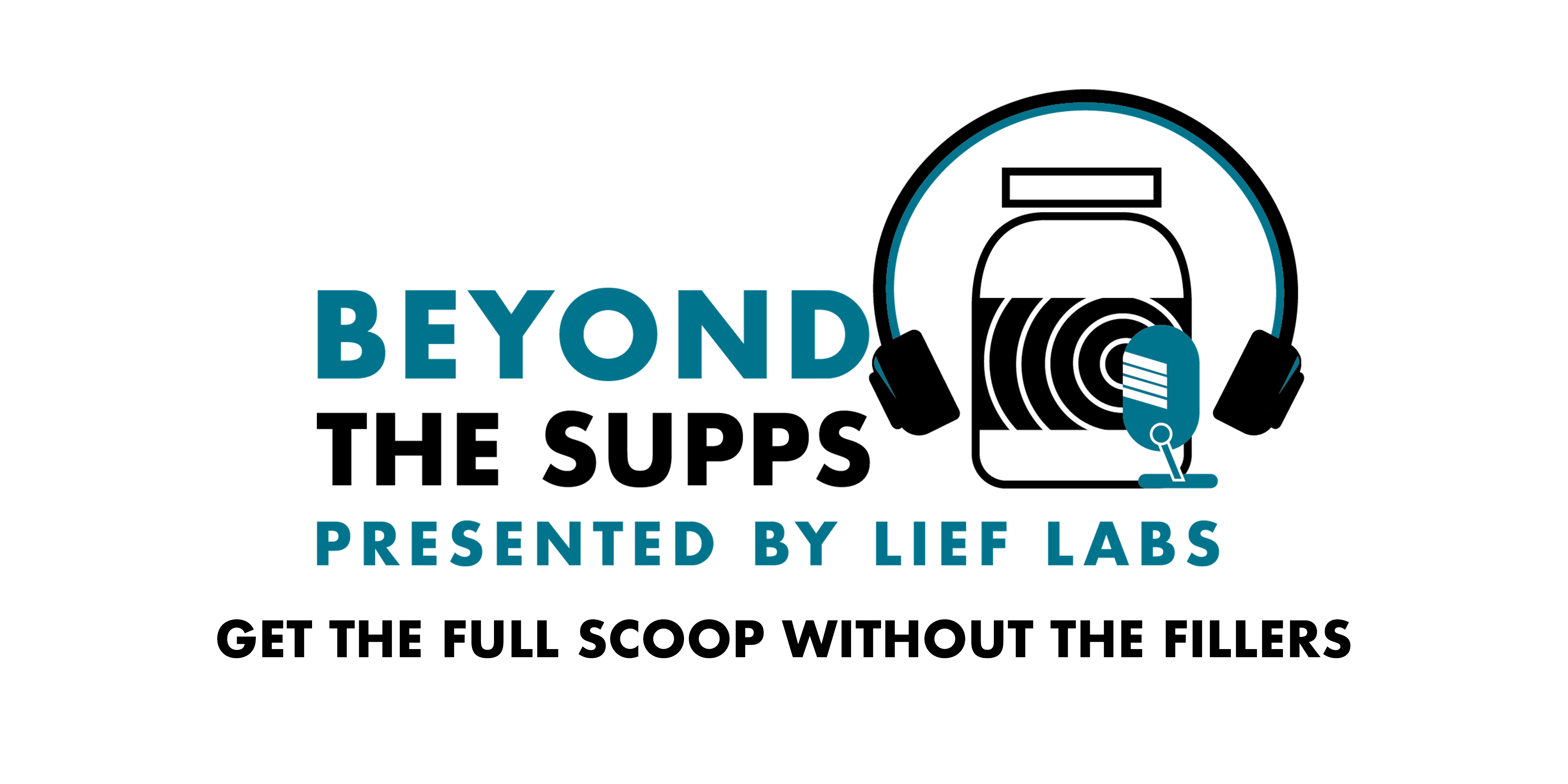
The Inside Scoop on Excipients
An excipient is defined as an inactive substance that serves as the medium for an active substance. The idea that excipients are “bad” has gained a lot of traction amongst both consumers and brand owners. The majority of excipients are designated by the FDA as Generally Recognized As Safe (GRAS). It is important to understand that, when used with the correct practices, excipients are harmless and an essential part of creating a supplement. A manufacturer should have complete transparency with clients regarding the excipients being used in their formula(s). At Lief, we make sure to only use excipients that are designated as GRAS and discussed with our customers.
Excipients are commonly used in formulas that require additional flowability and lubrication such as pre-workouts and multi-vitamins, along with most capsule and tablet formulas. Formulas that usually do not require excipients are free flowing powders such as collagen, whey protein and certain amino acids.
Although excipients won’t add any therapeutic value to a supplement, when used properly, they add value through efficiency, preservation and consistent quality.
By breaking down the reasons why excipients are being used, we hope to bring a sense of clarity and understanding to their purpose and place in the process of creating a supplement.
3 Main Uses for Excipients
Efficiency
Excipients are added to formulas to increase production and manufacturing efficiencies. This is especially important in cases where a formula is abrasive or dry. Excipients can be used to increase lubrication, flowability and compressibility so production machines can run smoother and faster. This, in turn, creates faster lead times for the product and less damage on machines.
Example: The excipient Magnesium Stearate is used as a lubricant in capsules that have dry or abrasive active materials. Without Magnesium Stearate, capsules can have trouble closing and machinery can malfunction during production.
Preservatives
Preservative excipients are mainly used in formulas that contain hygroscopic materials. These materials tend to absorb moisture and need excipients that act as a drying or flowing agent to combat clumping. Less clumps and more flowability contributes to a pleasant experience for the consumer that will last throughout the product’s entirety.
Example: The excipients silicon dioxide and calcium silicate are used in powder formulas to help increase flowability and minimize clumping. If you have ever found broken capsules in a bottle, it was most likely the result of a hygroscopic formula that needed calcium silicate.
Fillers
A filling agent is used when an active material by itself does not provide enough substance to consistently meet a fill weight or fill line. Fillers are also used to contribute to the aesthetics of a product. In cases where capsules are produced without fillers, it is common to end up with some capsules that look full, some capsules that do not look full and inconsistent density per capsule. This can lead to concerns and complaints from customers. The addition of a filling agent is a simple, safe and effective solution.
Example: Rice powder is used as a filler for products that need a consistent weight and fill line. For a plant sourced filler, microcrystalline cellulose (MCC) can be used. As a bonus, both rice powder and MCC also add lubrication and flowability to a formula.
______________________________________________________________
One of the biggest concerns among brand owners is using excipients in products that are organic. Although there are alternative organic excipients available, these options result in prices that are 2 to 3 times higher and a decrease in efficiency. Compared to regular excipients, which can help produce capsules at a maximum rate of 90,000 per hour, organic excipients limit capsule production to a maximum rate of 40,000 per hour.
Just as a manufacturer should be completely transparent with clients on excipient use, brand owners should be completely transparent with their consumers as well. That being said, excipients must always be listed in the “other ingredients” section on the supplement facts panel of a product.
The opportunity to positively market the excipient(s) in a product is commonly overlooked. Use the addition of excipients as a chance to connect with consumers through transparency and education. Brands can find creative ways to explain why an excipient is being used and the value it adds to the product.
Our in-house product development team is here to ensure that the best practices are being used when adding excipients to formulas. The use of excipients is completely situational and will differ with each formula. Lief is meticulous about choosing excipients that are most compatible with your product and your brand. We ensure your product results in the best possible efficiency and is most cost effective.
Wellness Through Innovation
It is our mission to provide a seamless customer experience through innovative collaborations, highest-quality products, and unparalleled service. Get started today with a free quote.
Wellness Through Innovation
It is our mission to provide a seamless customer experience through innovative collaborations, highest-quality products, and unparalleled service. Get started today with a free quote.
Wellness Through Innovation
It is our mission to provide a seamless customer experience through innovative collaborations, highest-quality products, and unparalleled service. Get started today with a free quote.
Let's Stay Connected
Contact
-
+1.661.775.2500
-
28903 Avenue Paine
Valencia, CA 91355 USA -
Main Headquarters Hours
Monday - Friday 8AM to 5PM -
Shipping & Receiving Warehouse Hours
Monday - Friday 8AM to 2:30PM
Disclaimer: The information provided by Lief Labs on our website is for general informational purposes only. The information on the website does not constitute legal or other professional advice. All information on Lief Labs’ website is provided in good faith, however we make no representation or warranty of any kind, express or implied, regarding the accuracy, adequacy, validity, reliability, or completeness of any information on our website and/or the links provided. Lief Labs and its parents, subsidiaries, owners, shareholders, and employees are not liable for any damages arising in contract, tort or otherwise from the use of any information on our website. Because your business has its own unique needs, you should consult with legal counsel experienced in FDA, FTC and regulatory matters.
© Copyright 2024 by Lief Organics. All Rights Reserved.

